- Home
- Jeff Lindsay
Double Dexter Page 9
Double Dexter Read online
Page 9
“Lunch, Debs,” I said patiently. “Like maybe Mexican food?”
The light came on and she lurched over to the ME. “I want stomach contents from the autopsy,” I heard her say. “See if he ate any tacos recently.” Oddly enough, the ME looked at her without surprise, but I suppose if you have worked with corpses and cops in Miami long enough you are very hard to surprise, and a request to search for tacos in a dead officer’s stomach was mere routine. The ME just nodded wearily, and Deborah stalked off to talk to Duarte, leaving me to twiddle my thumbs and think deep thoughts.
I thought them for a few minutes, but I didn’t come up with anything more profound than the realization that I was hungry, and there was nothing for me to eat here. There was also nothing for me to do; no blood spatter at all, and the other geeks from Forensics had things well in hand.
I turned away from Gunther’s body and looked around the perimeter. The usual crowd of casual ghouls was still there, standing in back of the tape in a jostling bunch as if they were waiting to get into a rock concert. They were staring at the body and, to their credit, one or two of them actually tried very hard to look horrified as they craned their necks to see. Of course, most of the others made up for it by leaning forward over the tape to get a better picture with their cell phones. Soon the pictures of Officer Gunther’s smooshed corpse would be all over the Web, and the whole world could join together and pretend to be appalled and dismayed in perfect harmony. Isn’t technology wonderful?
I hung around and made helpful suggestions for a little while longer, but as usual, no one seemed to care about my thoughtful insights; real expertise is never appreciated. People would always rather muddle along in their own dim, blundering way than have someone else point out where they were going wrong—even if that other person is clearly brighter.
And so it was that at an hour depressingly far beyond lunchtime, an underappreciated and underutilized Dexter finally got bored enough to hitch a ride back to the land of real work waiting for me in my little cubbyhole. I found a friendly cop who was headed that way. He just wanted to talk about fishing, and since I do know something about that, we got along very nicely. He was even willing to make a quick stop along the way for some Chinese takeout, which was certainly a very chummy gesture, and in gratitude I paid for his order of shrimp lo mein.
By the time I said good-bye to my new BFF and sat down at my desk with my fragrant lunch, I was beginning to feel like there might be some actual point to this patchwork quilt of humiliation and suffering we call Life. The hot-and-sour soup was very good, the dumplings were tender and juicy, and the kung pao was hot enough to make me sweat. I caught myself feeling rather contented as I finished eating, and I wondered why. Could I really be so shallow that the simple act of eating a good lunch made me happy? Or was something deeper and more sinister at work here? Perhaps it was the MSG in the food, attacking the pleasure center in my brain and forcing me to feel good against my will.
Whatever it was, it was a relief to be out of the dark clouds that had been clustered around my head for the past few weeks. It was true that I had some legitimate worries, but I had been wallowing in them a little too much. Apparently, however, one meal of good Chinese food had cured me. I actually caught myself humming as I tossed the empty containers into the trash, a very surprising development for me. Was this real human happiness? From a dumpling? Perhaps I should notify some national mental health organization: Kung pao chicken works better than Zoloft. There might be a Nobel Prize waiting for me for this. Or at least a letter of thanks from China.
Whatever my lighthearted mood was really all about, it lasted almost until quitting time. I had gone down to the evidence room to return a few samples I’d been working with, and when I came back to my little cubbyhole I found a large and unpleasant surprise waiting for me.
My surprise was about five feet, ten inches, two hundred pounds of African-American anger, and it looked more like an exceptionally sinister insect than a human being. He was perched on two shiny prosthetic feet, and one of the metal claws he had for hands was doing something to my computer as I walked in.
“Why, Sergeant Doakes,” I said, with as much pleasantness as I could fake. “Do you need help logging onto Facebook?”
He jerked around to face me, clearly not expecting me to catch him snooping. “Nyuk ookig,” he said quite clearly; the same amateur surgeon who had removed his hands and feet had taken out his tongue, too, and having a pleasant conversation with the man had become nearly impossible.
Of course, it had never been easy; he had always hated me, always suspected what I was. I had never given him any reason to doubt my carefully manufactured innocence, but doubt it he did, and always had—even before I had failed to rescue him from his unfortunate surgery. I had tried, really I had: It just hadn’t quite worked out. To be fair to me, which is very important, I did get most of him back safely. But now he blamed me for the amputations as well as many other unspecified acts. And here he was at my computer, and he was “Nyuk ookig.”
“Nyuk?” I repeated brightly. “Really? Are you a fan of the Three Stooges, Sergeant? I never knew. Nyuk nyuk nyuk!”
He glared at me with even more venom, which added up to an impressive amount, and he reached down to the desk for the small notebook-size artificial-speech device he carried around. He punched in something, and the machine called out in its cheerful baritone, “Just! Looking!”
“Of course you are!” I said, with real synthetic good cheer, trying to match the bizarre happiness of his voice machine. “And no doubt doing a wonderful job of it! But unfortunately, you are accidentally looking on my private computer, in my private space, and technically speaking, that’s kind of against the rules.”
He glared at me some more; really, the man had become completely one-note. Without taking his eyes off me he punched in something new on his speech machine and after a moment it called out, in its unlikely and happy voice, “I will! Get! You! Someday! Maa-ther. Fucker!”
“I’m sure you will,” I said soothingly. “But you’ll have to do it on your own computer.” I smiled at him, just to show there were no hard feelings, and pointed in the direction of the door. “So if you don’t mind?”
He pulled a large breath of air in through his nostrils, and then hissed it out again through his teeth, all without blinking, and then he tucked the speech machine under his arm and stomped out of my office, taking the tatters of my good mood with him.
And now I had another reason for uneasiness. Why had Sergeant Doakes been looking on my computer? Obviously, he thought there was something incriminating to find—but what? And why now, on my computer, of all things? There could be absolutely no legitimate reason for him to look at my computer. I was reasonably sure he had no knowledge of or interest in IT. Since the loss of his limbs he had been given a desk job out of pity, so he could serve out his last few years and qualify for a full pension. He’d been working at some kind of useless administrative thing in Human Resources; I didn’t really know or care what.
So he had been here, in my space, on my computer, strictly as a part of his private program to Demolish Dexter—but right here at work? Why? As far as I knew, he had always confined his attempts to “get” me to general surveillance, and he had never actually snooped through my things before. What had brought on this new and unwelcome escalation? Had he finally slipped over the line into a kind of hostile insanity, permanently focused on me? Or did he really have some reason to think he was onto something specific, and he had a chance to prove me guilty?
It seemed impossible, on the face of it. I mean, of course I really am guilty, of many somethings, all of them lethal and very enjoyable and technically not quite legal. But I was extremely careful, I always cleaned up nicely afterward, and I could not imagine what Doakes thought he might come up with. I was fairly sure that there was nothing there to find.
It was puzzling, and very unsettling. But at least it jolted me out of my stupid good cheer and back into gene
ral gloominess again. So much for Chinese food: Half an hour later you’re grumpy again.
Deborah, however, was even grumpier when she slouched into my office as I was getting ready to go home.
“You took off early,” she said, “from the Torch.” And she made it sound like she was accusing me of stealing office supplies.
“I had to go to work,” I said, and I did what I could to match her surly tone.
She blinked. “What the hell has gotten into you lately?” she said. I took a breath, more to stall for time than because I needed air. “What do you mean?”
She pursed her lips, cocked her head to one side. “You’re jumpy all the time. You snap at people. Maybe a little distracted? I don’t know. Like something’s bothering you.”
It was a very uncomfortable moment for me. She was right, of course, but how much could I tell her? Something was bothering me; I was convinced that someone had seen me and recognized me, and now I had caught Sergeant Doakes looking at my computer. It was nearly impossible to connect the two things in any way—the idea of some anonymous witness to Me at Play teaming up with Doakes to get me was ludicrous—but taken together, the two separate things had knocked me for a very uneasy loop. I was in the grip of illogical emotions, and I was not used to that at all.
But what could I say to her? Debs and I had always been close, of course, but that was partly because we didn’t share our feelings with each other. We couldn’t; I didn’t have any, and she was too ashamed of hers to admit she had them.
Still, I had to say something, and when I thought about it, she was probably the only one in the world I could really talk to, unless I was willing to shell out a hundred dollars an hour to talk to a shrink, which seemed like a very bad idea; I would either have to tell him the truth about myself, which was unthinkable, or make up some plausible fiction, which was certainly a waste of good money that might be put toward Lily Anne’s medical school tuition.
“I didn’t know it showed,” I said at last.
Debs snorted. “Dexter. This is me. We grew up together; we work together—I know you better than anybody else in the world. To me, it shows.” She raised an eyebrow encouragingly. “So what is it?”
She was right, of course. She did know me better than anyone else—better than Rita, or Brian, or anybody I had ever known, with the possible exception of Harry, our long-dead dad. Like Harry, Deborah even knew about Dark Dexter and his happy slashing, and she had come to terms with it. If ever there was a time to talk, and a person to talk to, it was now, with her. I closed my eyes for a moment, and tried to think of how to begin. “I don’t know,” I said. “It’s just that, um … a few weeks ago, when I was—”
Deborah’s radio squawked, a loud and rude electronic belch, and then it said quite clearly, “Sergeant Morgan, what is your twenty?” She shook her head at me and held her radio up.
“This is Morgan,” she said. “I’m in Forensics.”
“You’d better come down here, Sergeant,” a voice said over the radio. “I think we found something you need to see.”
Deborah looked at me. “Sorry,” she said. She pushed the button on the radio and said, “On my way.” Then she got up and started for the door, hesitated, and turned back to me. “We’ll talk later, Dex, okay?”
“Sure,” I said. “Don’t worry about me.” Apparently it didn’t sound as pitiful to her as it did to me; she just nodded and hurried out the door. And I finished closing up shop for the night and then headed to my car.
NINE
THE SUN WAS STILL BRIGHT IN THE SKY WHEN I GOT HOME. It was one of the very few benefits of summer in Miami: The temperature may be ninety-seven, and the humidity well over a hundred percent, but at least when you got home at six o’clock, there was still plenty of daylight left, so you could sit outside with your family and sweat for another hour and a half.
But, of course, my little family did no such thing. We were natives; tans are for tourists, and we preferred the comfort of central air-conditioning. Besides, since my brother, Brian, had given Cody and Astor a Wii, they hadn’t left the house at all except by force. They both seemed unwilling to leave the room where the thing sat, for any reason. We’d had to make some very strict rules about using the Wii: They had to ask first, and they had to finish their homework before they turned it on, and they could play with it no more than an hour a day.
So when I came into the house and saw Cody and Astor already standing in front of the TV with their Wii controllers clutched tightly in their hands, my first question was automatic. “Homework all done?” I said.
They didn’t even look up; Cody just nodded, and Astor frowned. “We finished it at after-school,” she said.
“All right,” I said. “Where’s Lily Anne?”
“With Mom,” Astor said, frowning deeper at my continuing interruption.
“And where’s Mom?”
“Dunno,” she said, waving her controller and jerking spasmodically with whatever was happening on the screen. Cody glanced at me—it was Astor’s play—and he shrugged slightly. He almost never said more than three words at a time, one small side effect of the abuse he’d received from his biological father, and Astor did most of the talking for both of them. But at the moment she seemed uncharacteristically unwilling to talk—probably a continuing miff over impending braces. So I took a breath and tried to shake off my growing irritation at both of them.
“Fine,” I said. “Thank you for asking, yes, I did have a hard day at work. But I already feel a lot better, now that I’m here nestled in the warm bosom of my family. I’ve enjoyed our little chat very much.”
Cody gave a funny little half smirk and said, very softly, “Bosom.” Astor said nothing; she just gritted her teeth and attacked a large monster on the screen. I sighed; as comforting as it may be to some of us, sarcasm, like youth, is wasted on the young. I gave up on the kids and went to look for Rita.
She wasn’t in the kitchen, which was a very large disappointment, since it meant she was not busily whipping up something wonderful for my dinner. There was nothing burbling on the stove, either. And it wasn’t leftover night; this was very puzzling and a little bit troublesome. I hoped this didn’t mean we were going to have to order pizza—although it made the kids happy, it simply could not compete with even the most casual of Rita’s efforts.
I went back through the living room and down the hall. Rita was not in the bathroom, and not in the bedroom, either. I began to wonder whether Freddy Krueger had grabbed her, too. I went to the bedroom window and looked out into the backyard.
Rita sat at the picnic table we’d put up under a large banyan tree that spread its branches over nearly half our backyard. She was holding Lily Anne on her lap with her left hand and sipping from a large glass of wine with the right. Other than that, she seemed to be doing absolutely nothing except staring back at the house and slowly shaking her head. As I watched she took a gulp of wine, hugged Lily Anne a little tighter for a moment, and then appeared to sigh heavily.
This was very strange behavior, and I had no idea what to make of it. I had never seen Rita act like this before—sitting alone and unhappy and drinking wine—and it was disturbing to see her doing it now, whatever the reason might be. It seemed to me, however, that the most important point was that, whatever Rita was doing, she was not cooking dinner, and that was just the sort of dangerous inaction that calls for prompt and vigorous intervention. So I wound my way back through the house, past Cody and Astor—still happily killing things on the TV screen—and on out the back door into the yard.
Rita looked up at me as I came outside and she seemed to freeze for a moment. Then she hurriedly turned away, put her wineglass down on the picnic table’s bench, and turned back around to face me. “I’m home,” I said, with cautious good cheer.
She sniffled loudly. “Yes, I know,” she said. “And now you’ll go get all sweaty again.”
I sat next to her; Lily Anne had begun to bounce as I approached, and I held out my han
ds for her. She launched herself toward me and Rita passed her over to me with a tired smile. “Oh,” Rita said, “you’re such a good daddy. Why can’t I just …” And she shook her head and snuffled again.
I looked away from Lily Anne’s bright and cheerful face and into Rita’s tired and unhappy one. Aside from a runny nose, she also seemed to have been crying; her cheeks were wet and her eyes looked red and a little swollen. “Um,” I said. “Is something wrong?”
Rita blotted at her eyes with the sleeve of her blouse and then turned around and took a large sip of wine. She put the glass back down again, behind her, and faced me once more. She opened her mouth to say something, bit her lip, and looked away, shaking her head.
Even Lily Anne seemed puzzled by Rita’s behavior, and she bounced vigorously for a moment, calling out, “Abbab bab bab!”
Rita looked at her with a small, tired smile. “She needs a fresh diaper,” Rita said, and before I could respond to that, Rita sobbed: just one small sob, and she strangled it off for the most part so that it might almost have been a hiccup, but I was very sure it was a sob. It seemed like overreacting to a dirty diaper.
I am not comfortable with emotions, partly because I do not have them and so I generally don’t understand where they come from and what they mean. But after years of careful study and a great deal of practice I had learned to cope when others displayed them, and I usually knew the correct response when a human being was in the grip of strong feelings.
In this case, however, I admit I was helpless. Going by the book, a woman’s tears generally called for comfort and reassurance, no matter how phony—but how could I apply either of those things if I didn’t know what was causing Rita’s crying fit? I looked at her carefully, searching her face for some clue, and found nothing; red-rimmed eyes and wet cheeks, yes, but unfortunately no one had scrawled a message on her face outlining a cause and a course of treatment. And so, sounding almost as awkward as I was beginning to feel, I stuttered out, “Uh, are you … I mean, is something wrong?”

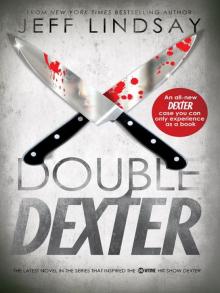 Double Dexter
Double Dexter Darkly Dreaming Dexter
Darkly Dreaming Dexter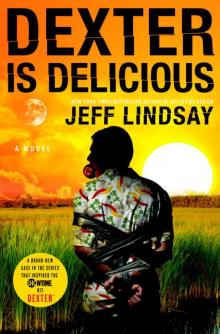 Dexter Is Delicious
Dexter Is Delicious Tropical Depression
Tropical Depression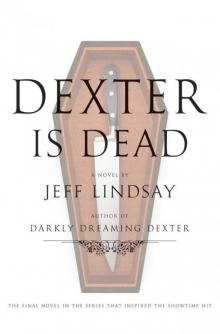 Dexter Is Dead
Dexter Is Dead Dexter's Final Cut
Dexter's Final Cut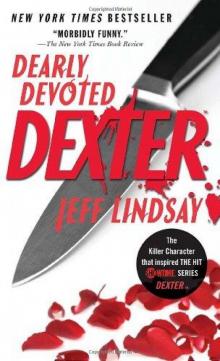 Dearly Devoted Dexter
Dearly Devoted Dexter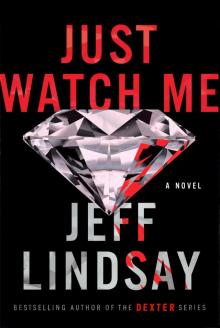 Just Watch Me
Just Watch Me Red Tide
Red Tide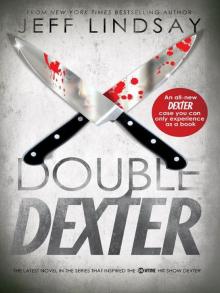 Double Dexter: A Novel
Double Dexter: A Novel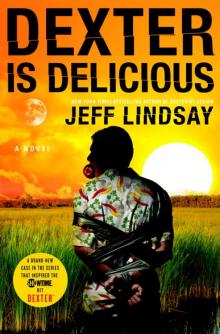 Dexter is Delicious: A Novel
Dexter is Delicious: A Novel Dexter's Final Cut d-7
Dexter's Final Cut d-7